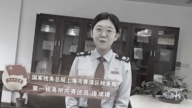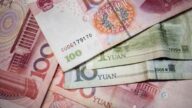【新唐人2013年02月18日讯】中共总书记习近平去年12月在广东视察时,对党内人士说,尽管中国有几十年的经济快速增长,仍然必须“深刻记取前苏联倒台的教训”。在广东这个活跃的资本主义省份,他要求中共回到传统的列宁主义。《纽约时报》近期报导了习近平关于“苏联教训”的讲话。报导认为,习近平透露出一种忧虑与恐惧,担心中国存在的各种问题可能会把党压垮。
《纽约时报》报导,当中国(共)新领导人习近平在视察中国南方时,他在公众面前把自己推崇为跟随邓小平步伐的大胆改革家,但与此同时,他在私下里对共产党官员却有另一番教导。
习近平说,苏联为什么会解体?苏共为什么会垮台?一个重要的原因是:理想信念动摇了。习近平还表示,中国不能在根本问题上发生颠覆性错误,这种情况如果出现,是无法挽回和无法弥补的。
这些话出自一份他的讲话总结稿,这份文件在官员中传阅,但并未由官方新闻媒体公开发布。
报导说,前记者、独立评论员高瑜是第一个公开习近平这些讲话的人,她把这些话发表在了博客上。三名知情人士曾经从官员或官方报纸主编那里看到这份文件,证实了文件的真实性。因为讨论党内事务有遭受处罚的危险,他们是以匿名的身份接受采访。
报导分析,这一消息显示,中共党内对于改革可能会导致中共垮台感到忧虑。
时事评论员林子旭:“不管习近平谈到这一问题的初衷是什么,他刚刚上台没多久就直接把苏联解体的问题拿出来讲,足见他心中对中共政权的不自信。”
那么,习近平所讲的到底是对什么信念动摇了呢?时事评论员林子旭指出,是共产党鼓吹的所谓共产主义信念。
林子旭:“时间走到2013年,今天中共的党员不仅仅是一个动摇的问题了,很多中共高官,已经对中共彻底失去信心,甚至已经产生反感了,民心更是已经一边倒的开始弃共了。大厦将倾,只有傻瓜才会愿意为一个腐朽的体制站台,今天中共的一些打手还不就是,想要弄些钱财和中共站在一起的吗?有个风吹草动,我想这些人跑的可能比谁都快。”
旅美中国问题研究人士张健表示,中国目前的情况和前苏联垮台前一样,有过之而无不及。
旅美中国问题研究人士张健:“比如通货膨胀,民怨载道,所有的东西都被寡头集团垄断,黑帮盛行、腐败重生,经济体制改革走入死胡同,这和前苏联是非常一致的。”
《纽约时报》指出,“推行改革”与捍卫党的自上而下“权力之间的冲突”,一直是中国走上经济改革之路以来一个永恒的主题。在习近平上台后,这种矛盾已变得尤其尖锐。
林子旭:“习近平上台以后,反腐的雷声虽然很大,但是雨点儿却不大,而且反腐的界限非常鲜明,副省级官员被拿下了好几个,更小的官员短时间之内就 可以被搞定十几名。但是像周永康这样的人已经被明确的举报了出来,我们却没有看到中共高层的任何反应,相反举报人的微博却被屏蔽了。”
高瑜引述“哈佛大学费正清中国研究中心”教授麦克法夸尔对习近平新中央的预测,麦克法夸尔认为:“中共内部改革的可能性很小,恐怕要靠大规模突发事件从外部触发改革。”
而林子旭指出,不论谁,有多大的本事,费尽多少心思,也挽救不了遥遥欲坠的中共独裁统治。
采访编辑/常春 后制/周天
New York Times: Xi Jinping Warns of “Lessons of the Former Soviet Union”
Xi Jinping told party insiders “despite decades of heady economic growth, China must still heed the ‘deeply profound’ lessons of the former Soviet Union” during his visit to Guangdong in December. In a province famed for its frenetic capitalism, he demanded a return to traditional Leninist discipline. New York Times reported Xi’s talk on “lessons from the Soviet Union”. The report stated that Xi‘s talk betrayed his fear and worry that social problems in China might cause the Party’s collapse.
As reported by New York Times, “When China’s new leader, Xi Jinping, visited the country‘s south to promote himself before the public as an audacious reformer following in the footsteps of Deng Xiaoping, he had another message to deliver to Communist Party officials behind closed doors.”
“Why did the Soviet Union disintegrate? Why did the Soviet Communist Party collapse? An important reason was that their ideals and convictions wavered,” Mr. Xi said. “We absolutely cannot allow any subversive errors when it comes to the fundamental issues,” Mr. Xi told party officials in Guangdong. “If that happens, there will be no going back.”
A summary of Xi’s comments has circulated among officials but has not been published by the state-run news media.
As reported, “Gao Yu, a former journalist and independent commentator, was the first to reveal Mr. Xi‘s comments, doing so on a blog. Three insiders, who were shown copies by officials or editors at state newspapers, confirmed their authenticity, speaking on the condition of anonymity because of the risk of punishment for discussing party affairs.”
The report further analyzed that Xi’s comments betrayed a fear that reform might overwhelm the party.
Commentator Lin Zixu: “No matter what Xi’s real intention was when he talked about the disintegration of the Soviet Union right after he took office. It does show quite clearly that he lacks confidence in the Party.”
When Xi said that the ideal wavered in the Soviet Union, what did he mean? Li Zixu says that the ideal was so-called communism.
Li Zixu: “Now it‘s 2013, and the communist ideal is not only wavering among CCP members. In fact, even a lot of senior have already lost their confidence in the party. The Party has lost popular support. The party is collapsing, and only idiots are willing to collapse together with it. The bullies hired by the Party are only working for money. Once they sense that the party is collapsing, they will run away immediately.”
Zhang Jian, Scholar in China’s Issues, stated that the situation in China is exactly the same if not worse than that in the Soviet Union before it collapsed.
Zhang Jian: “For example, inflation, discontent, monopoly, gangsterism, corruption and deadlock of economy, all of those phenomena were rampant in the Soviet Union before it‘s disintegration.”
In the New York Times it is stated that “The tension between embracing change and defending top-down party power has been an abiding theme in China.” “Mr. Xi has come to power at a time when such strains are especially acute.”
Li Zixu: “Since Xi Jinping came to power, anti-corruption has been raised in high profile. However, it has not brought results. Yes, a few provincial officials were taken down, and tens of junior officials have been taken down. However, senior officials, like Zhou Yongkang, have been reported for corruption, but nothing has happened to Zhou. Also of concern is that, those who reported Zhou were screened in their online microblogs.”
“Roderick MacFarquhar, Harvard Professor, predicted that the likelihood of the CCP reforming from within was very small, he said that reform would probably only be triggered by external, large-scale and eruptive events,” Gao Yu quoted Professor MacFarquhar’s comments.
Li Zixu has stated that nobody will be able to save the CCP from collapsing.






























